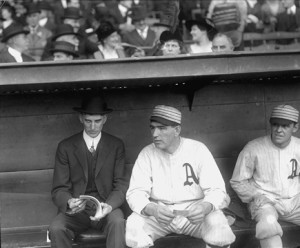What has to change for baseball to grow in Germany?
I have the impression that baseball in Germany is going through a downward trend. Clubs die or have to form syndicates, leagues consist of only a few teams and the number of youth teams decreases.
When baseball was still in its infancy, professional baseball also had problems
Of course, baseball in Germany has a lot of competition. Hardly anything can be done against king football. Other sports also have problems getting young people enthusiastic about their cause. Even those who would actually like to do sports can only rarely do it, since the introduction of the Abitur after 12 years of school has inflated many timetables and thus tied the students very much to the school.
Baseball, which is still considered boring, complicated and too American in Germany, also has to contend with its overall negative image. If a few athletes do get lost in the clubs, they are often scared away again. Sometimes they drive across a federal state on game days in order to have played in the outfield for 1 1/2 innings when their team lost 1:24 after driving for several hours. Incidentally, this scenario would not even be the worst, because scheduled games are often canceled because umpires or scorers are not available.
The overall high costs for equipment, space construction, away trips and sometimes nonsensical regulations (e.g. why does it have to be played in Germany in the lowest league with an overpriced official ball that can only be ordered exclusively from a dealer abroad?) Development not exactly positive.
I have played many sports in my life. I don't like any as much as baseball, though. No sport combines different requirements so perfectly. Nowhere else am I as self-reliant as a member of a team as in baseball. Nothing challenges my head so much and no other sport connects me so extremely with the past. Baseball shows me my flaws relentlessly, makes me despair, but offers so much happiness and makes me grow as a person. Without baseball, my life and my professional life would be poorer. As a teacher, I have been addressing baseball for years in AGs or elective courses. I have found that many are enthusiastic about this sport as soon as they get to know it better. In the end, I founded a club team with a group of students.
Hardly any other sport is as useful for schools as baseball . Buzzwords such as " interdisciplinary learning ", "personal responsibility" , " error tolerance " and " balance " would make education experts sit up and take notice. (Note: I have already discussed the benefits of baseball as a school sport in two previous blogs: posts from December 18 & 22, 2014). School could be the place where baseball could take a big place. However, this would require that the game be adapted to the conditions of the school, i.e. simplified.
However, no action at school is of any use if something does not change in the associations as well. Just waiting for a baseball Boris Becker to fall from the sky at some point, flooding the clubs with members, is not enough. Despite Michael Schumacher, no one drives more car races than before. Nor can it be that the responsibility remains solely with the clubs. Actions have to be started, like "Play-Ball" back then. Competitions in schools could easily be implemented. In tennis there is Low-T-Ball, which aims to introduce children to the game with the yellow ball. Why isn't there something like that in baseball? A "home run derby" is easily implemented. The narrowness of a sports hall would even be an advantage here. In addition, it must be made as easy as possible for the clubs to provide a team. Unnecessary costs must be eliminated and journeys must be kept short. There is no need for pointless bureaucracy. Why do clubs in the district league, for example, train a scorer or pay him if basically only the result counts?
Certainly a lot is easily written from my desk. If there are only a handful of clubs in a large federal state, the trips will be longer. But often you could combine teams in leagues that are geographically closer together. The difference between a district or state league is often not very big. Clubs play in different leagues, although they are only a few kilometers apart. The associations often prefer a football-like league structure. It is often enough forgotten that the league designations such as district, state or association league are often already understood for a certain level of performance and are therefore rather a deterrent for beginners. Maybe smaller tournaments are more suitable for new clubs than organizing a game that also places demands on a team. Finding a pitcher for 7 or even 9 innings is rather difficult. Often you won't find anyone at first who throws the ball in a reasonably controlled manner. For a whole game 2 or even 3 pitchers are necessary. What speaks against the fact that beginner teams may only have to pitch three innings in tournaments and the last two are contested with "soft tosses"? This may be hard for baseball purists to digest, but what frustrates a baseball beginner the most? 24 walks on 3 own hits in seven innings. Success on the offensive motivates. Pitching is difficult, and a team stands or falls with the quality of the pitch. Simplifications are necessary here in particular so that beginner teams are not overwhelmed too early.
I don't want to be taken to mean that I alone have the solution. Rather, I would like to see my thoughts as an impetus for a discussion and I am therefore already looking forward to as many comments as possible.
Many thanks to Sebastian Tietzel for this noticeable contribution about the state of baseball in Germany. Please write your thoughts in the comments so we can start a broad discussion about it. Is urgently needed.


